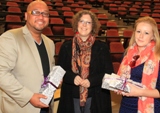
Political analyst, lecturer and writer, Mr Eusebius McKaiser brought the Eleventh Annual Teach-In Public Lecture Series entitled the “Rape Crisis” to a close on Friday, 26 July, with a lecture focused on the need to blow the lid off some of the silences which surround conversations about rape on South African university campuses.
“There are many social ills that are truths about the country, but also truths on university campuses, that are not talked about,” said Mr McKaiser. “There is no way that South African universities can be idyllic exceptions to the real world out there.”
Drawing on his experience of how Wits University responded to allegations of sexual harassment laid against a senior lecturer earlier this year, he said that institutional responses to the rape crisis have thus far been inadequate.
He argued that universities need to consider how best to create a space in which students feel safe to speak about rape. “There’s a lot of flack institutions need to take for their sheer silence,” said Mr McKaiser.
Perhaps part of the reason conversations about rape have remained only partially complete on campuses, according to Mr McKaiser, South Africa’s violent society has created a distorted sense of what it means to be a rape victim.
In this context, and particularly where alcohol has been involved, survivors who were drunk or did not experience extreme violence may be unsure whether they have in fact been raped and consequently self-censored. “We need to expand in the public discourse what it means to be raped,” he said.
Mr McKaiser took this to be only part of the problem, however. He also argued that institutions need to ask how they can create structures within which students and staff can express their opinions and deal with questions about the underlying causes of the rape crisis. “The real problem that you have on campus is a social problem,” he added.
Institutional leadership in tackling issues around the underlying causes of rape is something which he believes needs to improve if academics are to contribute to understanding and dealing with the crisis.
A further issue, according to McKaiser, is the adversarial and daunting nature of legalistic responses to the rape crisis. “The legal process can be more of a burden than it is helpful to students speaking up,” he said, highlighting also that the probability of victims getting justice is quite low.
He said that universities need to come up with a set of both legal and non-legal processes to ensure an adequate response to the rape crisis.
Ms Michelle Solomon, discussant for the week, added to this by saying that university leaders and lecturers should be able to respond appropriately in conversations about rape by familiarising themselves with the Sexual Offences Act as well as internal institutional policies on rape and sexual harassment.
“Are we doing what we need to do to be able to respond to sexual violence when it happens around us, if we don’t even know what the policies are?” she asked.
“When university structures do not respond adequately to rape survivors it deepens the trauma,” said Ms Solomon. “The fact of the matter is rape is a violent crime that traumatises people. We need to speak about that trauma.”
The Annual Teach-In takes the form of a week of public lectures hosted by the Rhodes University Department of Political and International Studies. These lectures bring a particular issue of interest and concern in the public sphere to the attention of the University and the wider community.
By Kyla Hazell
Photo by Stephen Penney
